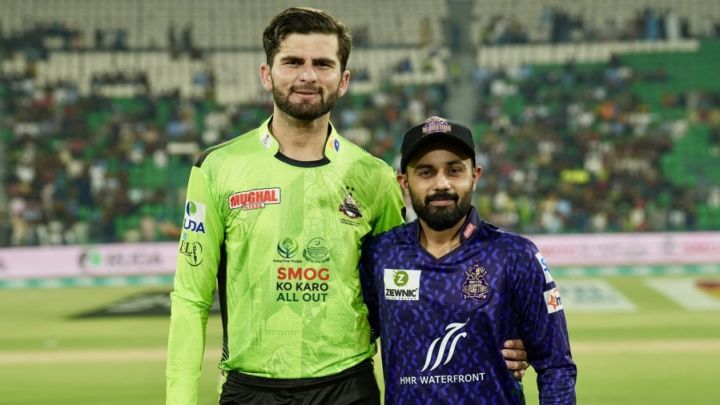Clinical Gladiators stand in the way of Qalandars juggernaut
Qalandars, at home, will captivate, but a well polished Gladiators enter the final with seven consecutive wins

Happy teams look better than they are, and Lahore Qalandars are very happy. Anchored, over a decade of inconsistencies and swings of form, by the philosophy that this is just a game to be enjoyed, Qalandars have radiated carefree freedom in a way no other side has quite managed. The butt of jokes, the punching bags, the lovable buffoons, local lads come good. All those personas, each so central to the city's identity as much as this team's, mean the Qalandars' biggest achievement - even as they go for their third title in four years - is the assembly of a cricket team in the image of the city they represent.
It is that infectious joy, more than the obvious quality Qalandars can produce on the nights they crank the dial up to 11, that can make this side seem like a juggernaut. As they did against a staid, sterile Islamabad United in Friday's Qualifier, or the mechanical, repeatable brilliance of Multan Sultans in each of their marches to the title a couple of seasons earlier.
Because when the league was suspended a fortnight earlier, Qalandars were arguably the hardest hit by absences from what remained of the season. Sam Billings, Daryl Mitchell and David Wiese did not return. Sikandar Raza came back, but only for a game - a knockout against Peshawar Zalmi. Haris Rauf and Zaman Khan, two mainstays of Qalandars' back-to-back titles, were both off colour and extremely expensive.
Qalandars plugged those gaps by bringing in two Sri Lankans - Kusal Perera and Bhanuka Rajapaksa - who hadn't played T20 cricket in three and four months respectively; they combined for 83 off 48 against United on Friday. Salman Mirza, the 31-year old fast bowler who made his first-class debut in the giddy heights of the Logan Cup in Zimbabwe 18 months earlier, has sparkled, taking seven wickets in three games. Mohammad Naeem looked like a player shoehorned into the side for the sake of further promoting the Qalandars player development programme, but is now a mainstay of the top order alongside Fakhar Zaman and Abdullah Shafique.
Stringing it all together is Shaheen Afridi, who continues to have his captaincy nous, leadership abilities, form, pace and fitness questioned. Having been through the full gamut of highs and lows with the national side, he has cut a forlorn figure in the Pakistan green of late. In Qalandars' pastel reinterpretation of the colour, though, he can produce some of his most stirring performances. In an environment where respect and affection for him are never in any doubt, he has soared yet again close to the top of the wickets charts, culminating in figures of 3.1-1-3-3 as Qalandars blew United away. He is on the cusp of a third PSL title as captain, one that, thanks to Qalandars snowballing momentum, suddenly feels inevitable.
But if Quetta Gladiators appear a sideshow in the final, it's because they've spent much of the last six weeks clinically stripping any jeopardy from their position. They last lost a match on April 18, and have produced seven wins in their last seven completed matches. Their most important overseas players - Finn Allen and Rilee Rossouw - have returned, and another pair of Sri Lankans - Avishka Fernando and Dinesh Chandimal - made handy contributions in the qualifier that took them to the final on Wednesday.
More ominously, though, Gladiators' trusty local bowling core stacks up against any across the league this season. Mohammad Amir has been near that wicked, wily best that has made him such an asset to any T20 franchise; no fast bowler with more wickets as an economy rate as low as his 7.41. That title belonged to his fast bowling partner Khurram Shahzad before an expensive last two games; in each of his first five he conceded 31 runs or fewer in his spell, and has as many wickets as Amir.
Abrar Ahmed is joint-second on the wickets charts with an economy even superior to Amir's, while one of the men who joins him on 16 wickets is his fellow allrounder Faheem Ashraf. The allrounder has enjoyed a remarkable resurgence this year, and topped up his bowling contributions with a devastating 23-ball 45 in the qualifier that earned him a player-of-the-match award, and his side a spot in the final. It has allowed the Gladiators to lock in four big-hitting batters in the top six, even if they are joined, somewhat less true to the Gladiators current slapdash brand, by Saud Shakeel as opener.
Gladiators' journey is almost the mirror opposite of Qalandars', having made three of the first four finals while Qalandars spent each of those seasons propping up the table. But though that victory in 2019 suggested the heralding of a dynasty, it was followed by a nosedive as the franchise lost its way, meandering meaninglessly through the next five seasons and missing out on the playoffs in four of them.
This year, they have meticulously worked to remove weaknesses from their side, while Qalandars appear to have done a phenomenally good job of papering over theirs. A Qalandars victory is probably what the narrative wants, the sponsors favour, and, of course, what Lahore's crowd, in this newly refurbished stadium, demands. But in this interminable, unhappy year for Pakistan cricket, the only constant has been you don't often get what you wish for. And for followers of the national side who might have forgotten what a happy team looks like, perhaps that is why this Qalandars unit feels quite this captivating.
Danyal Rasool is ESPNcricinfo's Pakistan correspondent. @Danny61000
Read in App
Elevate your reading experience on ESPNcricinfo App.